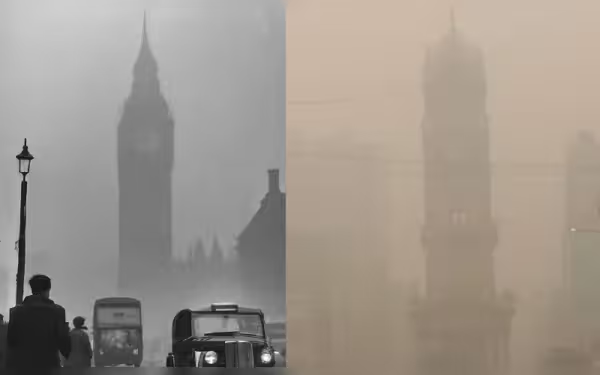Saturday, November 23, 2024 01:01 PM
Lahore's Air Quality Crisis: Lessons from London's Great Smog
- Lahore faces severe air pollution challenges.
- Public awareness is crucial for combating smog.
- Effective regulations can improve air quality.
 Image Credits: dawn.com
Image Credits: dawn.comLahore must learn from London's Great Smog to combat severe air pollution and prioritize public health.
The Great Smog of London in 1952 serves as a stark reminder of the dire consequences of unchecked industrial growth and air pollution. This catastrophic event, which enveloped the city in a thick blanket of smog for several days, resulted in thousands of premature deaths and highlighted the urgent need for effective environmental policies. Fast forward to today, and we find ourselves asking: "Can Lahore learn from this historical lesson?" As one of the most polluted cities in the world, Lahore faces a similar crisis, albeit under different circumstances.
Pakistan, despite contributing less than 1 percent to global carbon emissions, is grappling with severe air quality issues, particularly in Lahore and the broader Punjab region. The rapid industrialization, coupled with a growing population and increasing vehicular emissions, has led to a significant rise in smog and air pollution. The situation is exacerbated by factors such as crop burning, construction dust, and a lack of effective waste management systems. As a result, residents are often left to breathe in toxic air, leading to serious health problems.
In the wake of the Great Smog of London, the British government implemented stringent air quality regulations and invested in cleaner technologies. This proactive approach not only improved air quality but also set a precedent for other nations to follow. Lahore, on the other hand, seems to be lagging in adopting similar measures. The question arises: "What can Lahore learn from London’s experience?" The answer lies in the need for comprehensive environmental policies that prioritize public health and sustainable development.
One of the key lessons from London’s smog crisis is the importance of public awareness and community involvement. Educating citizens about the sources and effects of air pollution can empower them to take action. Initiatives such as tree planting drives, promoting public transport, and encouraging the use of cleaner fuels can significantly reduce pollution levels. Furthermore, the government must enforce stricter regulations on industries and vehicular emissions to ensure compliance.
While Lahore faces a daunting challenge in combating air pollution, it is not insurmountable. By learning from the past and implementing effective strategies, the city can pave the way for a healthier future. The time to act is now; the health of millions depends on it. As we reflect on the lessons from London’s Great Smog, let us hope that Lahore can rise to the occasion and become a beacon of environmental responsibility.













